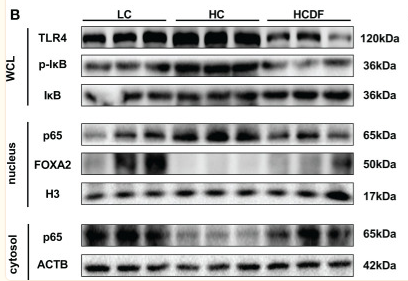IDO2 Antibody - #AF0009
| Product: | IDO2 Antibody |
| Catalog: | AF0009 |
| Description: | Rabbit polyclonal antibody to IDO2 |
| Application: | ELISA(peptide) |
| Cited expt.: | |
| Reactivity: | Human |
| Mol.Wt.: | 47kDa; 47kD(Calculated). |
| Uniprot: | Q6ZQW0 |
| RRID: | AB_2846779 |
Product Info
*The optimal dilutions should be determined by the end user.
*Tips:
WB: For western blot detection of denatured protein samples. IHC: For immunohistochemical detection of paraffin sections (IHC-p) or frozen sections (IHC-f) of tissue samples. IF/ICC: For immunofluorescence detection of cell samples. ELISA(peptide): For ELISA detection of antigenic peptide.
Cite Format: Affinity Biosciences Cat# AF0009, RRID:AB_2846779.
Fold/Unfold
3-dioxygenase 2; 3-dioxygenase-like protein 1; EC 1.13.11.; I23O2_HUMAN; IDO 2; IDO-2; Ido2; INDOL 1; Indoleamine 2; Indoleamine 2,3 dioxygenase 2; Indoleamine 2,3 dioxygenase like 1 protein; Indoleamine 2,3 dioxygenase like protein 1; Indoleamine pyrrole 2,3 dioxygenase like 1; Indoleamine pyrrole 2,3 dioxygenase like protein 1; Indoleamine-pyrrole 2;
Immunogens
A synthesized peptide derived from human IDO2
Detected in liver, small intestine, spleen, placenta, thymus, lung, brain, kidney, and colon (PubMed:17671174). Also expressed at low level in testis and thyroid. Not expressed in the majority of human tumor samples (>99%) (PubMed:25691885).
- Q6ZQW0 I23O2_HUMAN:
- Protein BLAST With
- NCBI/
- ExPASy/
- Uniprot
MLHFHYYDTSNKIMEPHRPNVKTAVPLSLESYHISEEYGFLLPDSLKELPDHYRPWMEIANKLPQLIDAHQLQAHVDKMPLLSCQFLKGHREQRLAHLVLSFLTMGYVWQEGEAQPAEVLPRNLALPFVEVSRNLGLPPILVHSDLVLTNWTKKDPDGFLEIGNLETIISFPGGESLHGFILVTALVEKEAVPGIKALVQATNAILQPNQEALLQALQRLRLSIQDITKTLGQMHDYVDPDIFYAGIRIFLSGWKDNPAMPAGLMYEGVSQEPLKYSGGSAAQSTVLHAFDEFLGIRHSKESGDFLYRMRDYMPPSHKAFIEDIHSAPSLRDYILSSGQDHLLTAYNQCVQALAELRSYHITMVTKYLITAAAKAKHGKPNHLPGPPQALKDRGTGGTAVMSFLKSVRDKTLESILHPRG
Research Backgrounds
Catalyzes the first and rate limiting step of the catabolism of the essential amino acid tryptophan along the kynurenine pathway. Involved in immune regulation. May not play a significant role in tryptophan-related tumoral resistance.
Detected in liver, small intestine, spleen, placenta, thymus, lung, brain, kidney, and colon. Also expressed at low level in testis and thyroid. Not expressed in the majority of human tumor samples (>99%).
Belongs to the indoleamine 2,3-dioxygenase family.
Research Fields
· Human Diseases > Infectious diseases: Parasitic > African trypanosomiasis.
· Metabolism > Amino acid metabolism > Tryptophan metabolism.
· Metabolism > Global and overview maps > Metabolic pathways.
References
Application: WB Species: Hu Sheep Sample: liver tissue
Restrictive clause
Affinity Biosciences tests all products strictly. Citations are provided as a resource for additional applications that have not been validated by Affinity Biosciences. Please choose the appropriate format for each application and consult Materials and Methods sections for additional details about the use of any product in these publications.
For Research Use Only.
Not for use in diagnostic or therapeutic procedures. Not for resale. Not for distribution without written consent. Affinity Biosciences will not be held responsible for patent infringement or other violations that may occur with the use of our products. Affinity Biosciences, Affinity Biosciences Logo and all other trademarks are the property of Affinity Biosciences LTD.
